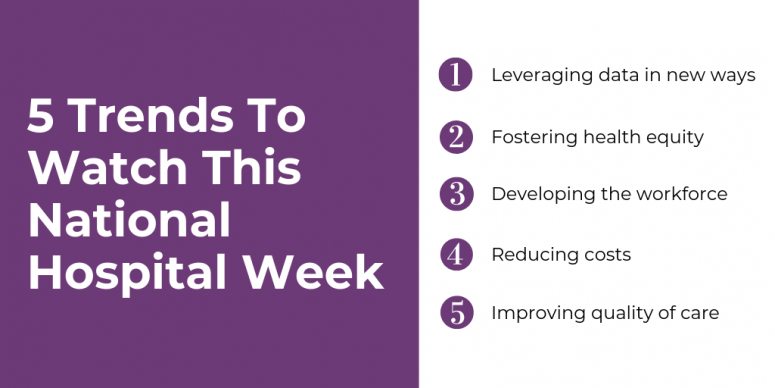
How we organize and deliver health care can have big impacts on its cost, quality, and accessibility. In honor of #NationalHospitalWeek, AcademyHealth takes a look at five trends in health care delivery and highlights AcademyHealth resources for each – including relevant sessions at the upcoming Annual Research Meeting (ARM).
1. Leveraging data in new ways
One growing hospital trend is the use of data-driven strategies. From wearable technology to artificial intelligence, advances in data are playing a vital role in health care systems. As AcademyHealth president and CEO Lisa Simpson said in a blog post last year, data is the “lifeblood of research.” It can be used to make more accurate diagnoses, improve interventions, understand gaps in care, and streamline research. AI is also becoming increasingly important to hospitals and health systems at the cutting edge of change, but also requires a closer look at how it can be broadly implemented most effectively. With more patient data collection, there is also growing concern about protecting privacy and improving the electronic health record system. Hospitals are also starting to expand telehealth, a topic that will be discussed more in-depth at an ARM session in June.
2. Fostering health equity
Health equity is another important topic. Living and working conditions, culture, education quality, economic stability, and many other factors contribute to community health disparities. Minority groups tend to have higher rates of heart disease, cancer, diabetes, and mental health issues and studies have long shown that racial bias affects quality of care. With this in mind, hospitals are grappling with their role in working towards health equity. A recent Health Affairs article discussed how municipal health departments can play a more effective role in promoting health equity. Health programs and interventions need to be community-focused and culturally-sensitive. With many rural hospitals closing, telehealth is emerging as a way to reach underserved populations and improve access to care. The topic of health disparities will also be discussed at an ARM session featuring Brad Wright, PhD, from the University of Iowa School of Public Health, and Megan Cole, PhD, from the Boston University School of Public Health.
3. Developing the workforce
Over the next few years, hospitals will see changing work environments. In light of the projected physician and nurse shortages, they need to improve work conditions to retain medical professionals. Currently, hospitals are looking at how to address these shortages and encourage new people to join the health workforce. Also, with the rise of a more diverse workforce, hospitals are trying to find new ways to promote equity and inclusion among employees. Research findings on this topic will also be presented at ARM. Studies focus on issues like inter-organization relationships, physician engagement, gender equity, frontline low-wage workers, teams and staffing, and how structural hospital factors affect quality and value of care.
4. Reducing costs
Going forward, hospitals are also looking at ways to cut costs. One way to do this is by curbing drug spending. Since drug prices are increasing rapidly, they account for a high percentage of hospital spending growth. Also, there is a current shift towards value-based care instead of fee-for-service. This shift has shaped the way hospitals think about costs and what they consider high and low value areas. The ARM will also feature sessions on how to cut low-value services, improve treatment value, and understand how to best care for high-need, high-cost patients.
5. Improving quality of care
Along with a shift to value-based care, hospitals and health systems are also focused on improving quality of care. Hospitals are moving towards encouraging wellness at all stages, in order to decrease emergency visits. A recent study found that while primary care visits fell drastically, ED visits are increasing, so hospitals are trying to addressing this issue. Also, hospitals are looking for new ways to improve care delivery and increase patient safety. These themes will also be discussed at ARM, and topics include primary care organizational innovations, assessments of current quality measurements, understanding cost variations, safety and quality on the front line, and ED readmissions.
For more on these and other important research topics, join us at ARM on June 2-4, 2019 in Washington, DC. Visit the website to register.